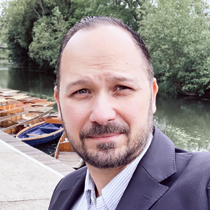Digital technology and organisational fluidity in British politics

The Lab
Level 2 of the Digital Studio
West Wing of Arts West
(access via the rear lift)
More Information
Part of the Digital Politics seminars series
The live stream for this seminar will start at 1.05pm on Wednesday 21 August via the Digital Studio live webpage.
Dr Anthony Ridge-Newman (@RidgeNewman)
Liverpool Hope University, UK
This seminar will examine how new technologies are impacting on the organisation of British political parties. Using the British Conservative Party as a case study, Dr Anthony Ridge-Newman will compare the impacts of technological advancements on British political organisation in two key periods of new media development: television in the 1950s, and digital technologies in the 2000s. The analytical framework draws on theories that explore the role of digital technologies in organisational fluidity.

Dr Anthony Ridge-Newman is a senior lecturer in digital media and political communication within the School of Humanities at Liverpool Hope University, UK. He is also convenor of the Political Studies Association (PSA) Conservatism Studies Group and founding chair of the Tory Research Impact Network. His research and teaching in the field of political communication has been previously based at the universities of Glasgow, London, Roehampton and Oxford. He has published three books: Reporting the Road to Brexit (2018); Tories and Television, 1951-1964 (2016); and Cameron's Conservatives and the Internet (2014). Dr Ridge-Newman has worked extensively in the public sphere, including as a journalist and news editor; and in public relations. Regularly appearing in global media, Dr Ridge-Newman has been featured in national and international broadcasts and press with the likes of the BBC, Associated Press, TRT World News, Sydney Morning Herald, New Scientist and Newsweek.
Image: Conservative and Unionist Party logo displayed on smartphone, Piotr Swat. Source: Shutterstock